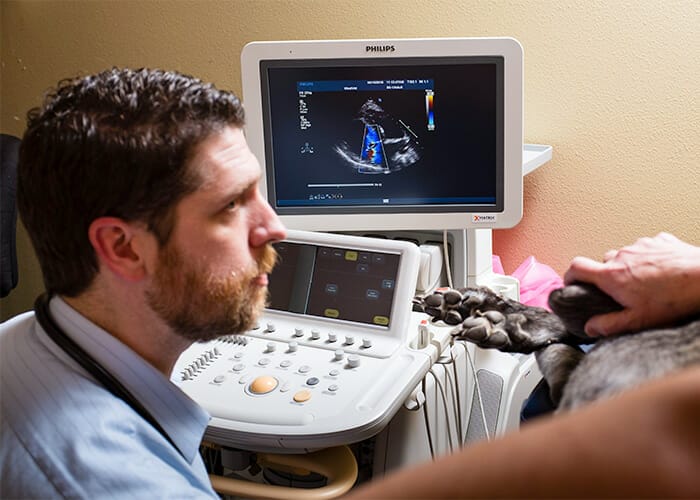
Echocardiography is the art of using ultrasound to view the structure and function of the heart in real time. Ultrasound is a highly informative, non-invasive, and safe diagnostic test in both human and veterinary medicine. This technique uses high frequency sound waves emitted from a hand-held probe to produce an ultrasound beam. This ultrasound beam is reflected from the tissues in the chest and heart and returns to the ultrasound probe to construct an image of the heart in motion. A variety of types of echocardiography are used to show the structure of the heart walls, chambers and valves (2 or 3-dimensional echocardiography), blood flow direction and velocity (Doppler echocardiography, including color, pulsed and continuous wave) and heart wall motion velocity (Tissue Doppler echocardiography).
How Can I Tell if My Pet Has Heart Disease?
Some pets with heart disease have symptoms, including cough, difficulty breathing, exercise intolerance, or fainting. Other pets may not have symptoms but may have a heart murmur or irregular heart rhythm detected by your family veterinarian. Routine screening for breeds at risk for heart disease or for pre-breeding purposes is also sometimes performed. If you are concerned that your pet may have heart disease, please discuss this with your veterinarian to determine if your pet should be examined by a veterinary cardiologist and have an echocardiogram.
How Does Echocardiography Help in the Diagnosis of a Heart Problem?
Echocardiography uses ultrasound waves to construct a real time image of the heart. It is considered the best test for the diagnosis of heart disease because it gives the cardiologist an image of the inside of the heart to determine how well the heart muscle is pumping, how well the valves are working and whether any defects are present inside the heart. Although echocardiography is the best test to evaluate the heart’s structure and function, the cardiologist may also need to examine chest X-rays (to look for fluid in the lungs = congestive heart failure), an electrocardiogram (to determine if the heart’s electrical rhythm is normal), a blood pressure, or bloodwork.
Will my Pet be Sedated or Anesthetized for the Echocardiogram?
The majority of animals do not need to be sedated or anesthetized for an echocardiogram. Dogs and cats getting an echocardiogram lie on a padded table with a cutout that allows the ultrasound probe to contact their chest wall. Veterinary technicians gently restrain pets for about 20 minutes during the examination. If sedation is necessary, the cardiologist will discuss this with you.
Will my Pet be Shaved for the Echocardiogram?
Most animals do not need to be shaved for an echocardiogram. A small amount of alcohol is used to separate the hair on the chest wall and water-soluble ultrasound gel is used to provide contact with the ultrasound probe. Occasionally, dogs or cats may need to have a small section of hair shaved to provide optimal imaging of their heart if their coat is very thick. Please tell the cardiologist if your pet should not have their hair shaved.
Is Echocardiography Uncomfortable?
No. Echocardiography is a painless procedure. The generation of an ultrasound image requires that the ultrasound probe gently contact the body wall, however, there is no sensation associated with the actual ultrasound. Your pet will lie on a padded table for the echocardiogram to provide additional comfort.
Do I Need to Withhold Food and Water Before my Pet’s Cardiology Appointment?
No. Your pet can eat and drink normally prior to their appointment. It is especially important not to withhold water from animals that are receiving heart medications.
How Long Will My Appointment Take?
A cardiology appointment is typically completed in 1½ to 2 hours. This includes the time during which the technician will discuss your pet’s history and plan for diagnostic testing, as well as the time for the echocardiogram and any other necessary tests to be performed. This appointment time also includes the time for the doctor to explain your pet’s test results, treatment plan, and follow-up plan with you at the end of your visit. One of the staff members will update you if more time is necessary on the day of your appointment.
Will any Other Tests Need to be Done to Help Diagnose my Pet?
If any other tests need to be done to help diagnose your pet’s heart condition, the cardiologist or technician will discuss this recommendation with you prior to performing these tests. Examples of other tests that may be necessary include chest X-rays to examine the lungs for evidence of congestive heart failure (fluid in the lungs), an electrocardiogram (EKG or ECG) to examine your pet’s heart rhythm, blood pressure, or bloodwork.
Will I Receive the Results of the Echocardiogram the Same Day?
Yes. The cardiologist examining your pet will meet with you and discuss the findings from the echocardiogram and a plan for therapy and follow-up if necessary. You will receive typed discharge instructions that will have all the information written down. This paperwork will be shared with your primary care veterinarian to facilitate a team approach for your pet’s care.
What is a Veterinary Cardiologist?
A veterinary cardiologist specializes in the diagnosis and treatment of heart disease in animals. The cardiologists at MedVet are dedicated to providing the best possible care for animals with heart conditions. We work together as a team with primary care veterinarians to achieve this goal. A Board-Certified Cardiologist is a Diplomate of the American College of Veterinary Internal Medicine (Cardiology). To become a board-certified cardiologist, our specialists have completed at least one year of a general internship after graduation from veterinary school followed by a three-year residency in cardiology under close supervision by board-certified cardiologists. Final board certification requires successful completion of a rigorous board examination. The cardiologists at MedVet are committed to continually improving their knowledge and practice by pursuing continuing education even after passing their board examinations. They also provide continuing education to the veterinary community both locally and nationally.